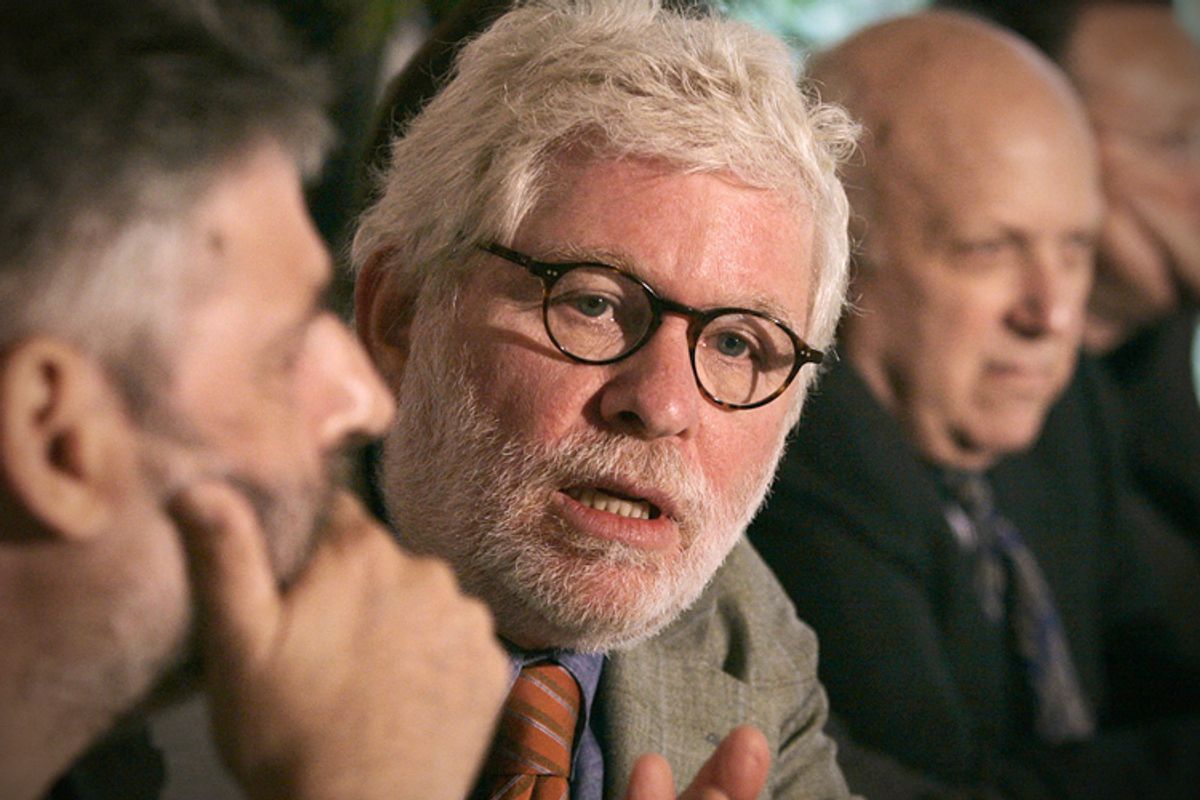It is no longer news when Washington Post columnist Richard Cohen writes something inflammatory, ignorant, absurd and/or bigoted. Asinine is his default setting. Earlier this year, Cohen wrote a defense of George Zimmerman’s choice to profile Trayvon Martin. When he was accused, rightly, of racism, the Washington Post defended Cohen, citing the importance of sharing “diverse points of view.” It makes a mockery of diversity to suggest that racism is a point of view, but there’s little point in trying to explain that to Cohen’s employers. He writes columns that get attention, and even bad attention is good attention in terms of measures like page views.
While it can be useful for people like Cohen to reveal who they really are, it is frustrating that Cohen gets the opportunity to do so, at will, for a major newspaper. In his latest column, on the difficulties New Jersey Gov. Chris Christie may have in wooing Republicans, Cohen offers a strange non sequitur, a hiccup of hatred, if you will. He writes, “People with conventional views must repress a gag reflex when considering the mayor-elect of New York—a white man married to a black women and with two biracial children. (Should I mention that Bill de Blasio’s wife, Chirlane McCray, used to be a lesbian?) This family represents the cultural changes that have enveloped parts—but not all—of America. To cultural conservatives, this doesn’t look like their country at all.”
There’s a lot to unpack in that statement. What a scandal, Cohen would have us believe — a man marrying a woman he loves and that couple having children together! The phrase “their country,” is particularly interesting, given American history, the people from whom this country was taken and the people on whose backs it was built.
Cohen is and has always been beneath contempt but he does offer us this: He provides a useful reminder of what modern and abiding ignorance looks like. It’s worth bringing attention to his ignorance and hatred but it’s more important to remember that he is by no means alone in his sad and narrow view of the world.
We know Cohen is not alone because conversations across the Internet often make it seem like we are trapped in a perpetual cycle of outrage. Something outrageous, in the truest sense of the word, is always happening. On social networks, we’re always voicing our reactions to these outrageous events. We read essays and “think pieces” about these outrageous events. We comment on the commentary. We do this because we can. Social networking has afforded us that access. We can throw our opinions into the void and sometimes, those opinions will be heard.
Last week, Richard Cohen said something racist and stupid and we talked about it online. We wrote about it. We responded to the writing. On the spectrum of Internet outrage, it was a blip. We were also still outraged about the murder of Renisha McBride and the amount of time (13 days) it took for “the homeowner” Theodore Wafer to be charged. In an article for the New York Times, Michael D. Shear suggested that the problems with the implementation of the Affordable Care Act mirror George W. Bush’s initial response to Hurricane Katrina. Of course there was a vociferous response across the Internet. The comparison is absurd, irresponsible and offensive. To say nothing would imply that this comparison is even remotely plausible. We were outraged.
On Sunday, USA Today published the awkward headline “'Holiday' Nearly Beat 'Thor' as Race-Themed Films Soar,” in an article about the romantic comedy "The Best Man Holiday." “Outrage” on Twitter was swift because the phrase “race-themed” completely misses the point of the movie. It suggests that movies featuring non-white casts can only be about race and not about the range of human experience explored in what I suppose we’re calling non-race-themed movies.
It is certainly overwhelming how quickly the Internet cycles from one outrage to the next, but the phrase “Internet outrage” is a bit smug and short-sighted, as if outrage did not exist in any other form. There are, clearly, degrees of outrage. Frustration about a lazy newspaper headline is not equal to the genuine and abiding outrage and sorrow over the murder of a young black woman. At the same time, it serves no purpose to waste time trying to measure how much outrage we should apportion to that which outrages us. It’s also safe to assume that there’s substance to our outrage and that we’re capable of being outraged and also experiencing other emotions, that we’re able to be outraged and sentient.
Whenever there’s a new wave of responses to something online, we start to see exclamations of “outrage exhaustion.” People rush to judge the way others choose to express their outrage. Some ask, “Why must you exhaust me with your unruly emotions?” when the better question might be, “Why can’t I look away from your unruly emotions?”
I suspect this exhaustion rises from how much more aware we are than we once were of cultural problems great and small, and how impotent we often are to create much-needed solutions. It would be ideal if we could not only express outrage but also offer tangible solutions to the problems that inspired said outrage. But nothing is ever that simple.
Internet outrage can seem mindless but it rarely is. To make that assumption is dismissive. There’s something beneath the outrage — an unwillingness to be silent in the face of ignorance, hatred or injustice. Outrage may not always be productive but it is far better than silence.



Shares